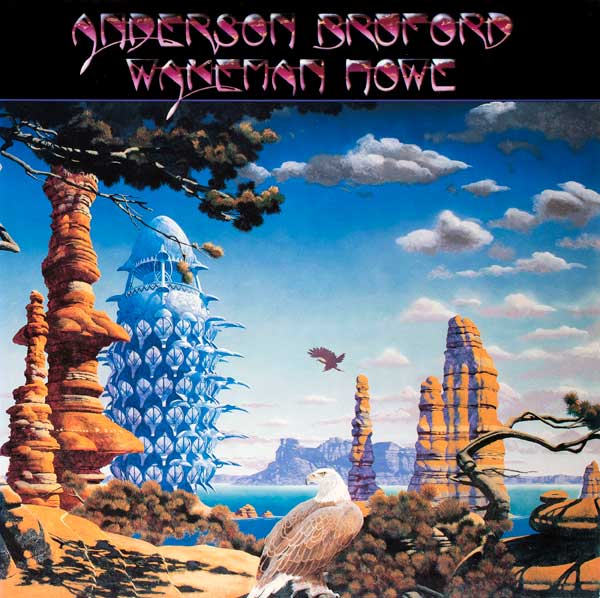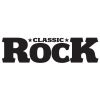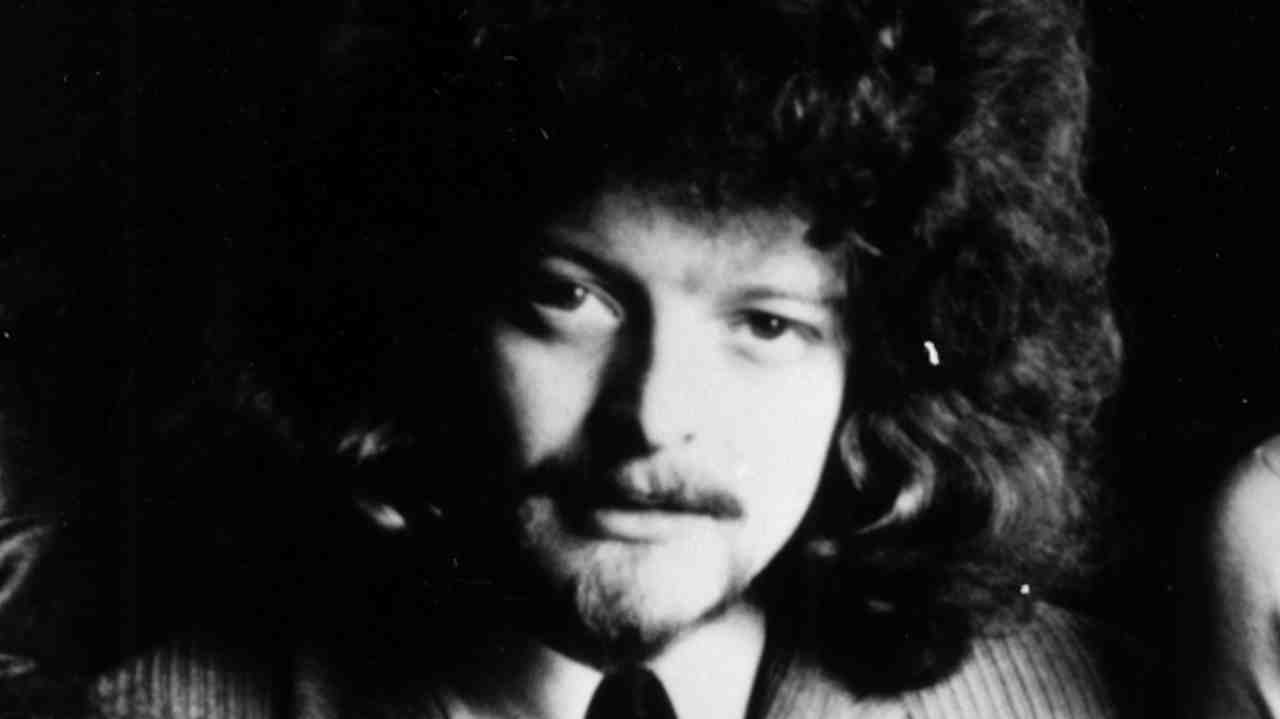You can trust Louder

1. Themes
2. Fist of Fire
3. Brother of Mine
4. Birthright
5. The Meeting
6. Quartet
7. Teakbois
8. Order of the Universe
9. The Universe
If Jon Anderson had prevailed, it could have emerged under the name The Affirmative. If the more waggish members of the ensemble had had their way, it could even have been attributed to No.
Pragmatically, this 1989 album from the version of Yes that wasn’t technically Yes came out under its members’ surnames, and provided another confusing chapter to the biography of the band that has rarely followed linear logic, either in its constitution or its sound.
At the time, the brand name was owned by Anderson, Squire and White. The latter pair were quite happy working with Trevor Rabin as key writer; Anderson less so. He preferred Yesmusic to stretch out, not compress. Reuniting with three other names who qualified as bona fide Yes men appealed to him. Bruford mooted King Crimson friend Tony Levin for bass.
Legalities, however, meant they couldn’t even bill live shows as featuring ‘Yes music’ without the other faction suing. The craziness calmed down when differences were resolved – under record company pressure – for 1991’s Union, wherein both chapters of the clan were shoehorned together on one Frankenstein’s monster of an album. Naturally, that harmony was short-lived…
So how does the album stand up? Is it the ‘Yes by any other name’ album it’s generally documented as, or a maverick side-project? On the surface it’s exactly the riposte to the other group’s slick power-plays Anderson hoped for. His cosmos-high voice chirrups about inner and outer space, Wakeman constructs layered edifices of synth, Bruford uses his return to the fold to eschew the obvious and Howe adapts his lead work to the production techniques of the time. The elements are there.
So does it take off? Sometimes, but not always.

Sign up below to get the latest from Classic Rock, plus exclusive special offers, direct to your inbox!
Every week, Album of the Week Club listens to and discusses the album in question, votes on how good it is, and publishes our findings, with the aim of giving people reliable reviews and the wider rock community the chance to contribute.

Other albums released in June 1989
- Agent Orange - Sodom
- Flowers in the Dirt - Paul McCartney
- Passion - Peter Gabriel
- In Step - Stevie Ray Vaughan and Double Trouble
- World in Motion - Jackson Browne
- Trouble in Angel City - Lion
- Extreme Aggression - Kreator
- Gretchen Goes To Nebraska - King's X
- Mr. Big - Mr. Big
- The Real Thing - Faith No More
- Cosmic Thing - The B-52s
- The End of the Innocence - Don Henley
- The Iron Man: The Musical - Pete Townshend
- Magnum Cum Louder - Hoodoo Gurus
- Margin Walker - Fugazi

What they said...
" Jon Anderson's tenor wails through spacy lyrics, Rick Wakeman constructs cathedrals of synthesized sound, Steve Howe rips high-pitched guitar leads, and Bill Bruford makes his drums sound like timpani. For all that, it's a pedestrian effort for these veterans, not as bombastic as some of their stuff, not as inspired as others, but it definitely has the "Yes" sound. She Gives Me Love even refers to Long Distance Runaround." (AllMusic)
"With the release of Anderson Bruford Wakeman Howe, Yes was back as a progressive rock band. The album was successful enough to lead to a merging of the two estranged branches of Yes, which led to the successful Union Tour (and the much less successful Union album) that followed, and also led Yes back to their roots. It's a shame that for many, ABWH has become the forgotten Yes album." (Sputnik Music)
"Listen to the rock-bottom Fist Of Fire. Wakeman’s garish synthesised horn-blasts are comically bad, his keyboard runs at the end of the verses are alarmingly loud, and Anderson’s yelping of embarrassing fantasy cliche lyrics are the poisoned cherry on top. One has to feel particularly sorry for Bill Bruford who has never sounded worse – the plastic, brash drum sound he is given is jarring and never gels, his performance on Themes being headache-inducing as a result." (Witch Doctor)

What you said...
Steve Pereira: Yes are the epitome of progressive music. Close To The Edge is the greatest ever prog album - the album that pointed the way for what was possible with symphonic prog; but Tales From Topographical Oceans sums up for many everything that is awful about prog rock. They pulled themselves together after Tales - modifying their impulse to be ambitious, leaning more on conventional song structures, recording the occasional focused track, such as Wonderous Stories, and remaining a commercial force - but by the late 80s they were not quite at their 70s peak; indeed, the essential creative team had dissipated, with the remnants drifting in and out - the only constant being Chris Squire.
Jon (who had left and returned) was unsatisfied by the commercial sound that producer Trevor Horn had delivered on 1983's 90125 and 1987's Big Generator (making them sound like a cross between Yes and Buggles). Jon wanted a return to the classic Yes, and pulled together the old team who had recorded Fragile and Close To The Edge: Anderson, Bruford, Wakeman, and Howe. Quite why Squire wasn't included in Jon's new band is unclear. So a new (or old) Yes band was assembled; but, because of a legal agreement in May 1984 that all present and former Yes members had signed, only the existing band - whoever was in it - could be called Yes; so instead they used their surnames as the band name.
The album was clearly Jon's project - he was assimilating ideas and even recordings from the others, and putting them together in his own way, before assembling everyone (apart from Howe) on Montserrat to record the album. Credit for all the songs are given equally to Anderson, Howe, Wakeman, and Bruford, though Howe has reported that he had no part in composing some songs, and the others had no part in composing his songs.
There are nine tracks on the album, four of those are divided into short suites, the longest of which, at 10:16, is Brother of Mine. Howe not being present during the recording generally means that his guitar pieces are rather swamped by Wakeman's keyboards - as can be noticed when comparing the alternative version of Fist of Fire on the In A Word: Yes boxset, in which Howe was present and produces some typically searing and soaring guitar.
Bruford was using a hybrid electronic and acoustic drum set, which gives a different sound to that of the classic Yes period of Fragile and Close To The Edge. Wakeman, who was clearly engaged, switched on, and perhaps with an ambitious desire to show what he could do back in the 70s, seems on this album to behave more as a hired hand, and money rather than desire may have been what prompted him to do the album, as he'd been having financial problems for most of the 80s.
Jon's lyrics appear to focus on the idea that music made from love and friendship is better than music made for money. It's not quite a concept album, but is close to it. The opening lines of the first track, "Be gone you ever piercing / Power Play machine / Cutting our musical solidarity" appears to set the theme that Jon is rejecting commercial/corporate music in favour of "musical solidarity". Fist of Fire introduces a bird image which will reappear, and is perhaps symbolic of the power of "true" and natural music. Brother of Mine has "Brothers...in the big sky" who see Jon "fly like an eagle".
Birthright appears to be vaguely about big countries/powers identified as "stars and stripes" and "white and red" which are too big for a small new born country - it may make reference to atomic bomb tests in Australia in the 1950s which contaminated the land so it couldn't be returned to the aborigines until 2014. "My love" and "she" in The Meeting and Quartet could refer to music, or the inspiration/the muse which creates music. Teakbois - a word that possibly relates to wood and nature, is perhaps the celebration of natural music over the corporate music, and Anderson brings back the bird symbol - "I've dreamed of music that comes from the heart / As though the eagle has landed".
The Order of The Universe celebrates rock music: "Rock gives courage, a way to win the trust / Rock gives lovers a way to win or bust / Rock gives sisters a way to speak their mind / Without this gift of rock and roll / We'd all be wasting time". The final track, Let's Pretend, ends the album with a sense of coming together in love and nature to return to something wholesome: "Let's get our hearts together / And as before, and like before / We'll do again". So there is a rough sense that the lyrics are about the classic Yes coming together in love to make natural music once again, rather than for money, as had been the case with the previous Yes albums.
The music is remarkably softer and more pastoral than previous 80s Yes albums - indeed, more pastoral than Yes at their peak. It is, though, closer in style and intent and sound to the 70s Yes than the 80s Yes. What perhaps holds the album back is the feeling that the band are not fully engaged creatively or spiritually with the album. It feels like a group of session musicians going through the motions, and lacks the energy and tightness of something like Close To The Edge. But it's not a bad album. It's certainly a better album than I expected. I had stopped listening to Yes by the time it was originally released in 1989, and though I did listen to it reasonably closely a few years ago I did so with a degree of prejudice accumulated though what Yes had been releasing from Tormato onwards.
The album opens with Themes, which has the feel of Fragile, but with less energy and inventiveness. It's an attractive though modest piece which becomes a little repetitive, and doesn't fully develop or go anywhere. Fist of Fire is brighter and more assertive, though has the same issue as Themes in that the musical structure doesn't develop, and it feels too repetitive. This feeling of unambitious, undeveloped, and repetitive music will become a common theme across the album.
Brother of Mine is one of the strongest tracks on the album, and one that feels like the classic Yes with some changes in time signature to keep it interesting. Birthtrack is another brighter, stronger track, which contains some sounds like aborigine musical instruments to key in to the possible theme of the atomic tests at Maralinga. The Meeting is the most pastoral and acoustic track with some pensive piano, though rarely develops beyond the feel of a demo.
Quartet is a pleasant pastoral piece that doesn't really go anywhere and eventually overstays its welcome. It has an attractive sound, but at nine minutes long with no contrast, the attraction does wear out. Teakbois is the weakest track on the album - a piece of nonsense calypso style music which flirts with native Australian music, and feels rather falsely happy clappy, and - like Quartet - at over seven minutes overstays its welcome. Order of The Universe competes with Brother of Mine for which is the strongest track, closest to classic Yes. The album finishes with the very pleasant Let's Pretend, which could almost have come off The Yes Album.
All in all a much better album than those which immediately proceeded and followed it. It does stand out as a decent attempt to make something worthwhile rather than something just for the money. But in the attempt to make an album like the classic Yes albums it ends up making the listener make a comparison in which ABWH will always come off as second best. It does invoke memories of the classic period, and - somewhat awkwardly - in Quartet Jon makes lyrical references to older Yes songs: Long Distance Runaround, Gates of Delirium, Roundabout, etc; but such invocation makes one feel sad that the band one is listening to isn't able to come up with the goods.
So, not a turkey by any means. But, also, sadly, not the soaring eagle it so wishes to be. 6/10.
Robby Jackson: An album that should have stayed in the 80s. Yes...? No.
Jacob Tannehill: At the time everyone wanted to be Yes. But nobody wanted to work together. Definitely not a terrible album, and songs are good, but suffered from bad era of production. As much as I love Tony Levin, his playing didn’t fit Yes. I agree with others that the live album that followed was a lot better.
Right after this came Union. And then everyone tried to be Yes together… but that’s for a different day.
Greg Schwepe: Long time fan of Yes and the many offshoot bands, projects, solo albums, etc. Yet somehow this one eluded me when it first came out and didn't first hear until I found a used copy a few years ago. For this project we get four of the members who made my favorite Yes albums, minus Chris Squire. On bass is Tony Levin, who is no slouch.
Before you can even get to the music you have to understand the immense lineup changes there have been with these musicians over the years. One guy leaves…another guy takes his place. Then the guy who left… comes back again...then leaves. Another new guy… and it goes on. In this case they’re not even using the name “Yes”, but instead a wordy mouthful to soon be referred to by its acronym; “ABWH.” But we do get a cool Roger Dean album cover!
This was even a slightly rocky start for me as while I like Rick Wakeman’s keyboard style, I’m just not a fan of the staccato style piano chattering in Themes. But by midway it flows into another “theme” and all is good. If you’ve listened to any Yes and King Crimson, you can right away hear Bill Bruford’s drumming style.
Fist of Fire, Brother of Mine, and Birthright have the sound like the classic sound of Yes, with similar song structures. Now everyone has modernized their instrumentation. Updated keyboard and guitar tones. After cranking it a little while in Asia, I think Steve Howe decided to bring along the same distortion pedal. But in reality, a lot of times I found myself asking "is there any guitar on this album?" Bits and pieces.
Call it “filler”, call it the “outlier”, but don’t call it good. I’m talking about Teakbois. Just not sure what the heck that song is. Kind of Calypso, Caribbean-sounding. Um, they could’ve left that one off as it doesn’t fit in with the rest of the songs at all.
Overall, not a bad Yes/Not Yes album. Great group of musicians that will meet again with Union. And boy, won’t that one get a musical discussion going.
Mike Canoe: While it certainly doesn't rock (or prog) very hard, the sole studio album by Anderson Bruford Wakeman Howe (and Levin) is an enjoyable and uplifting listen.
Given the pedigree and past ambitions of the principal players, I was worried that this would sound like four musicians playing four different pieces of music at the same time. Instead, there seems to be an amazing amount of shared grace and unity. Even longer pieces like Brother of Mine and Quartet never had me checking how much song was left.
There can be times the album is almost too bouncy and sunny. When Teakbois started playing, I seriously thought I had been autoplayed into a different album. And the last time that I heard music as buoyant as Order Of The Universe, I'm pretty sure my kids were little and we were at a theme park show involving aquatic mammals.
But these are minor grumbles because it's also a pretty good bet that I haven't listened to an album this universally positive in a long time. It made for a nice and needed change of pace.
Michael Böcher: At that time (end of the 80s) it was a very hard time for prog rock in general and Yes especially. After the smash 90125 the following album Big Generator did not meet the demands and was only a moderate success. It came to quarrels and in the end Anderson Bruford Wakeman and Howe came together, working together for the first time since the 70s.
Due to the absence of Chris Squire they could not use the Yes brand, so they decided to just put their names on the cover. The whole album is a return to some form. More proggy than 90125 but of course not like in the 70s again. Great songs like Themes, Fist of Fire and two longer tracks Brother of Mine (first single) and the rocking Order Of The Universe are accompanied by beautiful more calm songs like Birthright (great lyrics about nuclear testing) or the meeting.
And there is one famous stinker, the South American music influenced Teakbois. Not listenable. Great are the singing of Jon Anderson and the musicianship. Guitar could be louder. The problem in my view is the preference for E-Drums by Mr Bruford. Sometimes the whole music sounds a little bit dated due to the typical 80s cheesy sound, especially from the drums. But the songs themselves are very good to excellent. The album reached the US top 30 I think and was a moderate success. The following tour was great. I attended the gig in Frankfurt. Legendary. What came afterwards would become the fake reunion of all Yes members and the disastrous Union album. But that is another story. From me 9/10 for ABWH.
Dale Munday: Does it really matter if it was a Yes album or not ? When compared to its dreadful 80s predecessors, then some of the abominations that were to follow under the Yes brand name. With four classic Yes stalwarts on board how could it be anything but a Yes album.
It definitely suffers from the 80's production and will never come close to the 70s in terms of prog craftmanship. However it remains an anomaly in the Yes story , but a good one, with the exception of the godawful Teakbois.
Graham Tarry: Bought this at the time, and though it’s very enjoyable, and is unmistakably Yes with the beautiful voice of Jon Anderson, it lacks the melodies that made them so magical. Fly From Here to me is their best album following the drama of Drama.
John Davidson: Interesting. I ignored this on release but it's quite refreshing.to hear it now.
Bill Griffin: I'm a big Yes fan but, although I really wanted and tried to like this one, I just don't. There is nothing on this album that appeals to my ears. I don't hate it but I will never willingly play it either. I do like the b-side to the Brother Of Mine single, Vultures In The City, though.
Tiziano Caverni: A totally, unashamedly Yes album. Still enjoyable after many years, despite a "cutting edge" production that hasn't aged well. Beautiful, nevertheless.
Gary Claydon: To be honest, if I wanted to hear material from ABWH, I'd skip past this eponymous effort and go straight to An Evening of Yes Music Plus. This is OK but nothing stands out. Biggest problem, for me, is that Howe's guitar is too much in the background.
Philip Qvist: A decent album but I was never a huge fan of Yes. Some good songs on it but it wasn't an album that I was rushing out to buy at the time - and nothing has changed my opinion. A decent 6/10 - pleasant but no fireworks, while the production takes away a point.
James Erik: The production might be one of the big issues with the recording. That and Bruford diving head first into Simmons electronic drum pads…. The songs, though, are excellent, as is Anderson’s vocal delivery.
John Davidson: On the upside this sounds more like Yes than any of the other albums produced by the band in the 80s, but on the downside it still has some of that 80s 'fake polish' particularly around the keyboards, synth drums and bass.
The best thing about it is Anderson, who is in excellent voice and Howe, though he is playing Asia style rather than in a traditional classical/jazz style for most of the album is a much better fit for Yes music than Rabin.
What it lacks is any real stand-out killer songs. Brother Of Mine and Birthright are good songs (in fact there are no bad songs) but equally there is nothing that I would include in a best of Yes playlist. (whereas even the Keys to Ascension had Minddrive).
So, while it's no Close To The Edge or Going For The One, it's a lot better than Big Generator. 6/10.
Chris Elliott: It's pleasant enough but that's about as excited as I get. At it's best -Long Lost Brother most notably it sounds more Jon and Vangelis than Yes. That said compared to Union and everything after it's a beacon of light. Its definitely no Fragile - and it doesn't have the hooks from Asia - but at least it's not a third rate copy of the 1970s.
Joe Cogan: This is the best Yes album by any lineup since Going For The One, and alas, also the last great one from any lineup (other than their live follow-up, An Evening Of Yes Music Plus, where we finally got to hear Bruford playing the Close To The Edge songs live). Brother of Mine is absolute classic Yes (and FM radio stations played the entire album version when it came out!), and the rest of the songs are also excellent, with the exception of the cringeworthy Teakbois, which the NME (if I recall correctly) dismissed as "cod reggae" at the time. 9.5/10 (would be 10/10 if not for Teakbois).
Gary Claydon: I've always wondered what Tony Levin must have been thinking after the meeting to decide the band name. "Erm, guys, aren't we forgetting something? Guys?"

Final score: 7.01 (63 votes cast, total score 442)
Join the Album Of The Week Club on Facebook to join in. The history of rock, one album at a time.
Classic Rock is the online home of the world's best rock'n'roll magazine. We bring you breaking news, exclusive interviews and behind-the-scenes features, as well as unrivalled access to the biggest names in rock music; from Led Zeppelin to Deep Purple, Guns N’ Roses to the Rolling Stones, AC/DC to the Sex Pistols, and everything in between. Our expert writers bring you the very best on established and emerging bands plus everything you need to know about the mightiest new music releases.


